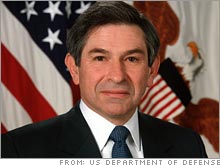 |
| Bush administration hawk and architect of the second gulf war has been elected to lead the World Bank. |
|
|
|
WASHINGTON (CNN) -
As expected, the 24 executive directors of the World Bank unanimously voted Thursday to elect Paul Wolfowitz president.
Wolfowitz, 61, was nominated by U.S. President Bush to lead the 184-nation development bank. Critics of the appointment pointed to his role as a leading Bush administration proponent of the war in Iraq.
Paul Wolfowitz, who takes the reins of the World Bank on June 1, has sought to allay fears in Europe and around the world that he would push the Bush administration's foreign policy agenda at the bank.
An unrelenting conservative, Wolfowitz, deputy secretary of defense, was criticized as an architect of the U.S. invasion in Iraq and his nomination by President Bush to replace James Wolfensohn at the World Bank was controversial among European countries and others that opposed the war.
But Wolfowitz, who was ultimately chosen without dissent Thursday to be the World Bank's 10th president, tackled his nomination with a determination that resembled the campaign to invade Iraq. He traveled to Brussels, spent hours on the phone with global anti-poverty activists like Irish rock star Bono and bank board members, and gave numerous media interviews.
As he sought to win backing of the 24-member board, his goal was to convince his new global constituency he was more multidimensional than his hard-line image.
"I'm about a lot more than military issues, about a lot more than just Iraq and that a good deal that has been written about me is an inaccurate caricature," he said in an interview with Reuters.
While many in Europe fumed privately at Bush's choice of Wolfowitz, not a single European government spoke out against his candidacy. Sources said grumbling was kept low in part because of European jostling for top jobs at other global agencies.
Wolfowitz, 61, is a prominent administration conservative with broad experience in world affairs, served as deputy secretary of defense since 2001 and is an expert on East Asia and the Middle East.
He was U.S. ambassador to Indonesia and served in the administration of Bush's father during the 1991 Gulf War.
In October 2003, during a visit to Baghdad, the hotel he was staying in was hit by several rockets in an attack that killed a U.S. Army lieutenant colonel and hurt 17 others. Wolfowitz escaped unharmed.
A LEADING U.S. HAWK
An energetic, quiet New York native, a prolific writer on foreign policy issues, and a leading hawk, Wolfowitz headed the prestigious Paul H. Nitze School of Advanced International Studies at Johns Hopkins University before landing his latest Pentagon post.
Wolfowitz was a leading patron of former Iraqi exile Ahmad Chalabi and his Iraqi National Congress, but critics argue that Chalabi funneled self-serving and faulty information to the U.S. government about Iraqi weapons programs. After a falling out with the U.S. government last year, Chalabi has refashioned himself as a vocal critic of American policy in Iraq.
Wolfowitz has been criticized for telling Congress a week into the war about Iraqi reconstruction: "We are dealing with a country that can really finance its own reconstruction, and relatively soon." Since then, billions of dollars in U.S. money have been expended in rebuilding Iraq.
House Democratic Leader Rep. Nancy Pelosi of California, who among others has called on Bush to fire Wolfowitz, said, "Maybe this is the president's way of removing him from the Defense Department. Otherwise, I can't see a match of credentials" for the World Bank job.
He served from 1989 to 1993 as undersecretary of defense for policy under Vice President Dick Cheney then defense secretary.
After leaving the administration of Bush's father, Wolfowitz questioned the U.S. decision not to remove Iraq's President Saddam Hussein from power as Gulf War ended in a crushing defeat for Iraq. He also has advocated supplying U.S. arms to Iraqi dissidents and setting up a safe haven for them in southern Iraq, perhaps with protection from the U.S. military.
At the Pentagon under Cheney, Wolfowitz was the principal civilian official responsible for strategy. Wolfowitz was ambassador to Indonesia from 1986 to 1989 after serving as assistant secretary of state for East Asian and Pacific affairs.
Paul Dundes Wolfowitz was born in New York on Dec. 22, 1943, and graduated from Cornell. He received master's and doctorate degrees in political science and economics from the University of Chicago.
He taught at Yale and at the National War College in Washington. He is divorced with three children.
Reuters contributed to this report.

|